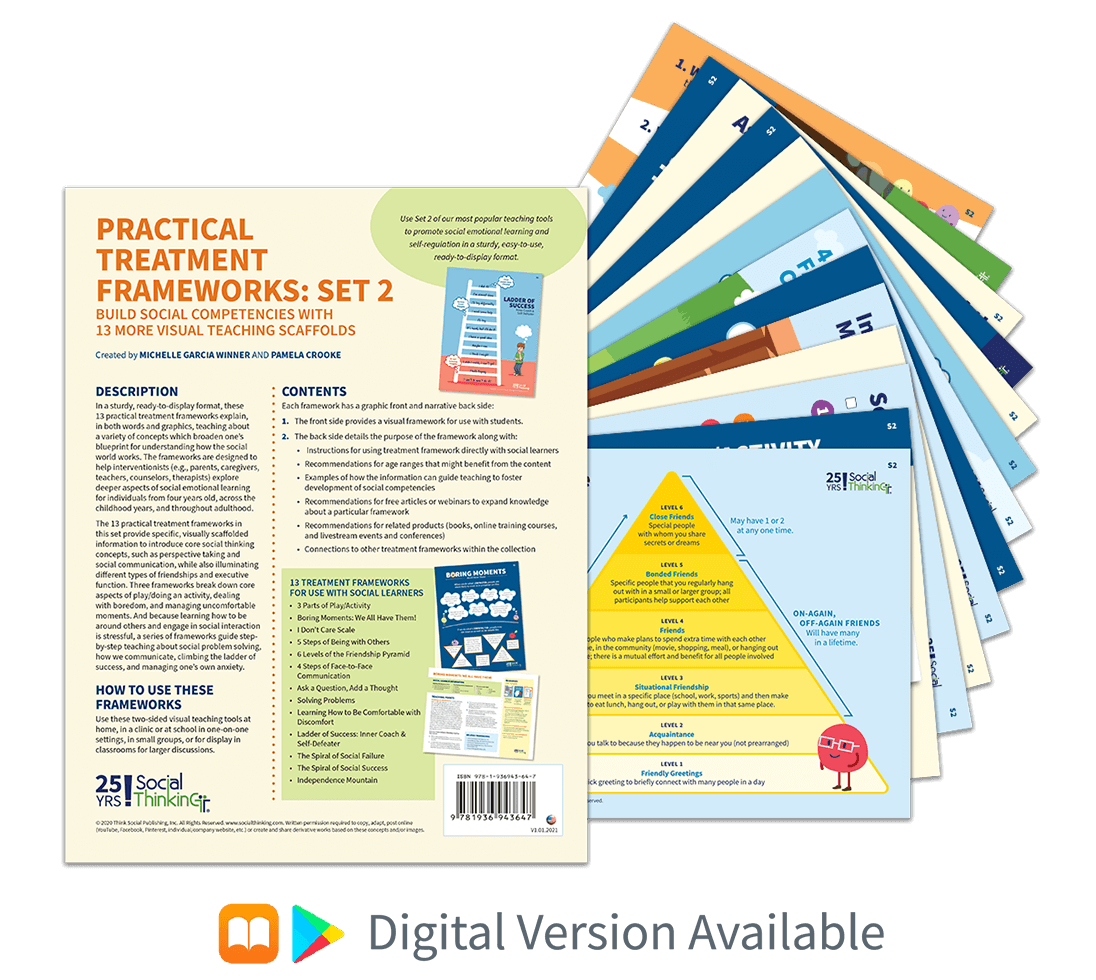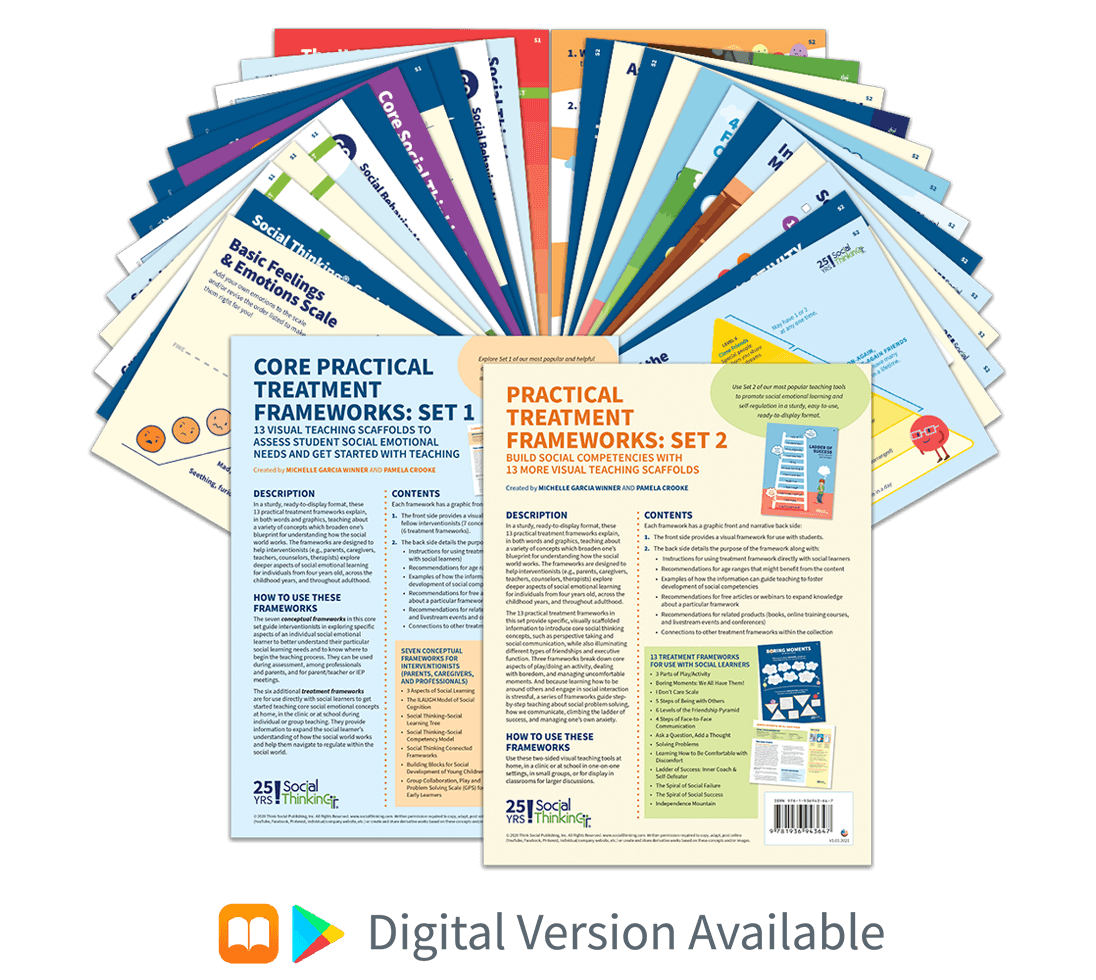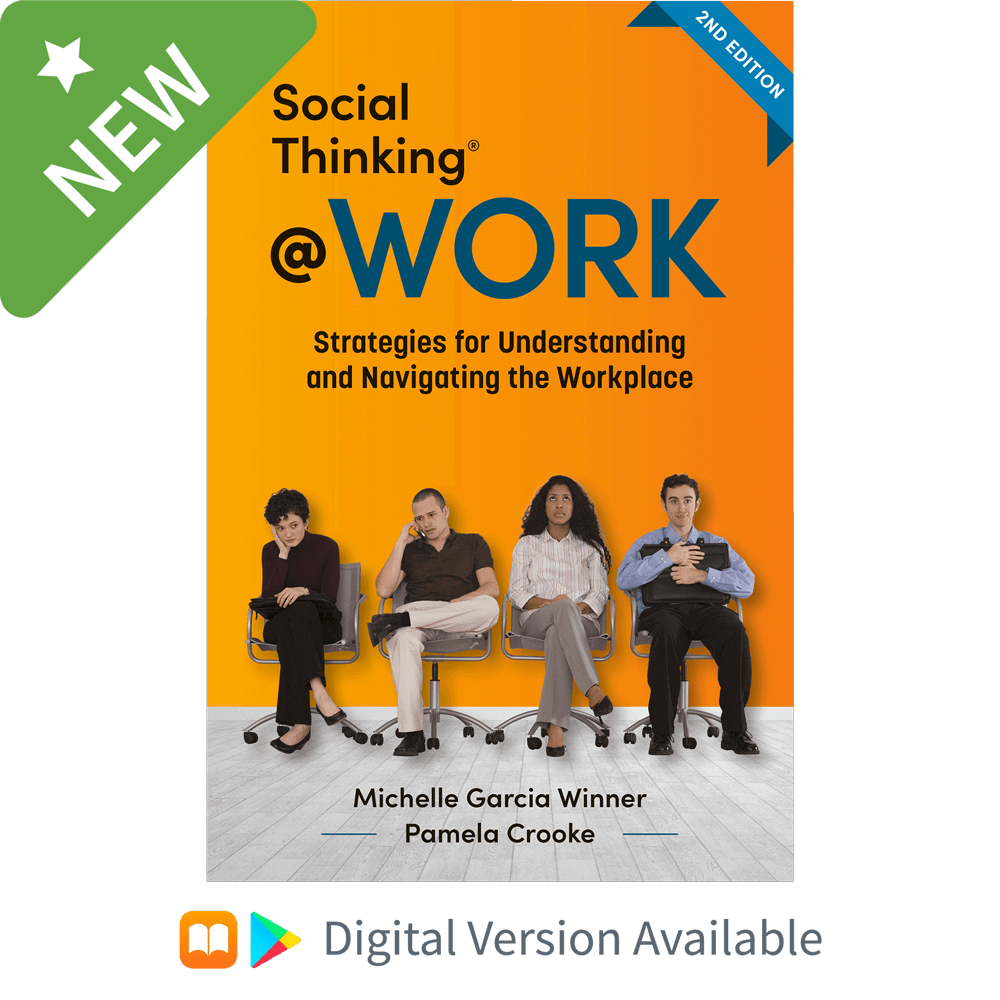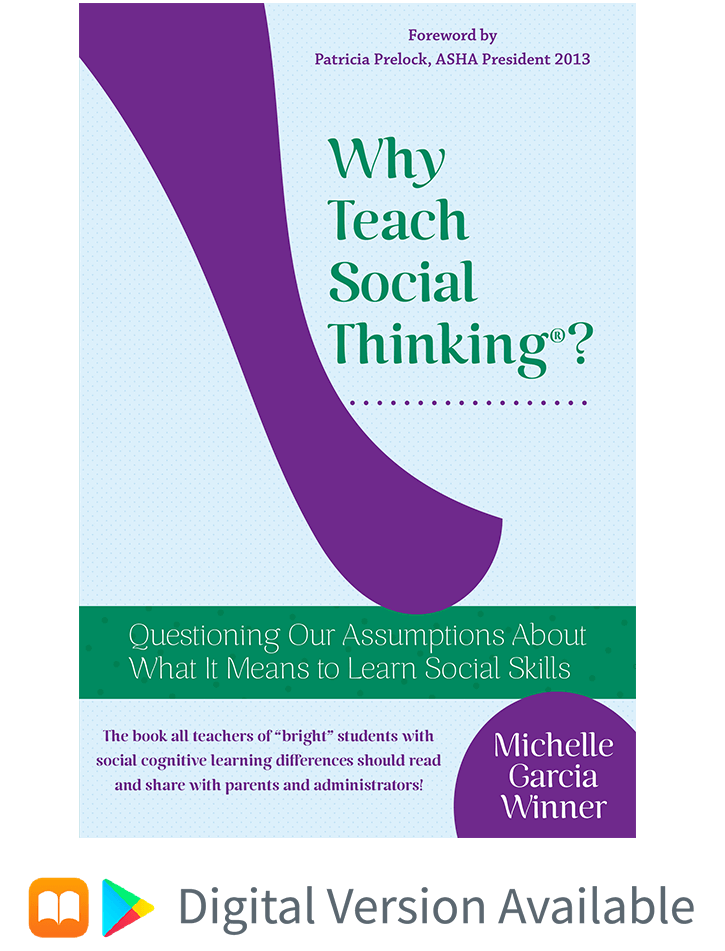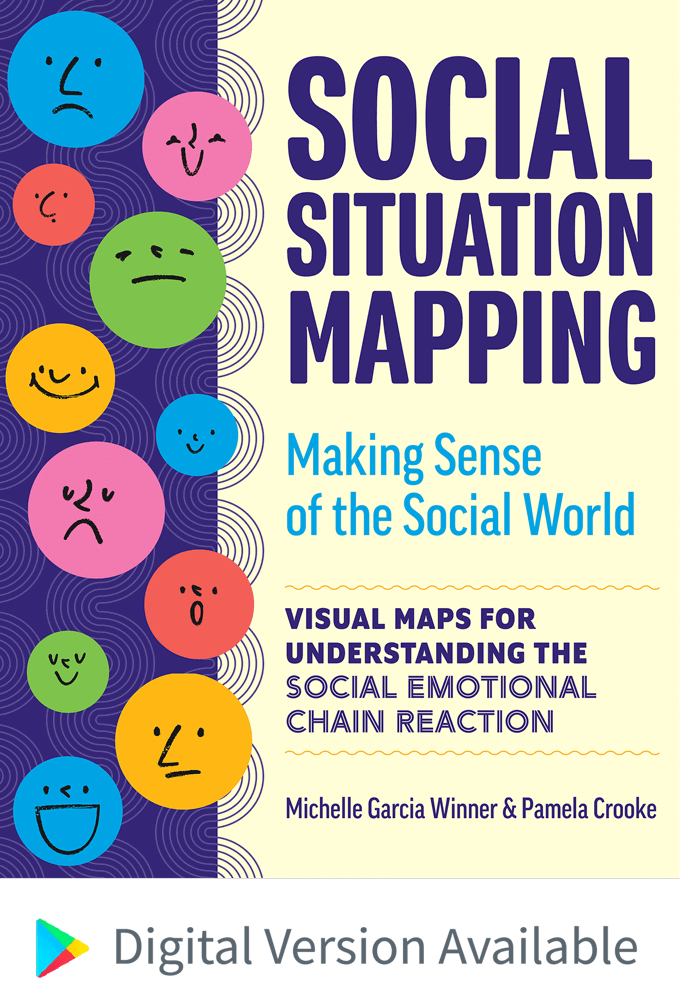Updated: March, 2022
© 2022 Think Social Publishing, Inc.
Here's the bottom line: The general public expects adults who do not manifest obvious social emotional learning differences to use social skills at work, in our families, and community that demonstrate awareness of others and how others may be feeling and thinking. Social skills can’t easily be memorized because they are behaviors interpreted by others based on what’s happening in a specific situation. For example, a response that is interpreted as “rude” is expected and valued in a situation where that person feels unduly threatened.
When in the presence of others, our social mind helps us to form social responses (social skills), as well as interpret other’s social responses. Our social mind is a persistent interpreter of others’ actions and reactions. To be interpreted as socially on point is to adapt one’s behavior effectively based on the situation. People are often described as having “good social skills” if their social behaviors make sense to others based on what is happening in that context. If social behaviors (actions, language, facial expression, body language, etc.) seem out of sync or insensitive to others—based on the situation, then they may be described as having “weak” or “poor social skills.”
Social thinking, while related to social skills, is a little more complex. It's the process through which we consider the situation, as well as the possible perspectives of the people in the situation, to figure out how to interpret what is happening. If we are participating in that situation, then we also have to figure out how to react/respond ourselves, and if we do it well, then we are said to have good social skills.
It's interesting to note that we actively teach specific work, academic and technical skills to adults, but we rarely teach them how to behave across a range of social situations in work, higher education, restaurants, retail, online, and in other venues.
Expectations from All Angles
The general public, including HR departments, expect those who demonstrate academic or work skill competencies to be socially competent by the time they reach adulthood. Think about it: the “smarter” we view a person, the higher our expectations that that person knows how to handle themselves in different social settings, including the workplace. Most of us assume that general intelligence and social intelligence go hand in hand—research shows they don’t! Furthermore, there is an assumption that the average adult who experiences a social problem in a work setting should recover quickly. This assumption is predicated on a host of other assumptions tied together: that the person can quickly and easily problem solve social dilemmas, knows of and is willing to use outside support, and can independently (and has the motivation to) go out and find whatever knowledge that might be helpful to figure out how to keep others in the environment relatively calm. That’s a tall order of (often subconscious) assumptions we heap on people when in social situations.
However, if someone does make a significant social blunder, co-workers, bosses, or onlookers don't usually reach out and help in the moment with explicit social instruction. Instead, they pretty much leave the person to figure it out alone and then go off and talk to other co-workers about how the person messed up. In other words, I may not tell you that I noticed your social mistake, nor offer any advice about handling a similar situation next time, but I'm happy to rehash it with several of my friends when you aren't around.
And here’s another interesting thought to consider. In business, we are more than willing to spend time and resources to specifically teach adults about the social conventions and social “rules” of other cultures if we think that will improve their ability to interact on a business level with people of that culture. But we can’t seem to appreciate the value of that same reasoning to help people understand the social conventions of our own culture.
Consequences of Expectations
Adults who consistently display a lack of social competencies in the workplace are typically referred to HR services, mental health counselors, or business “coaches.” Yet few professionals are trained in understanding the social mind, how to systematize the social learning process, or how to provide concrete strategies.
To make things more complicated, the media routinely describes social skills and social emotional problem solving as “soft skills.” But let’s be honest here: a lack of either provides anything but a soft landing. Social skill problems in adults are serious and complex. They can have a devastating effect on relationships, jobs, and mental health. Finding real and lasting help can be difficult.
This is where Social Thinking® steps in.
We emphasize that the social learning process is an actual learning system that most of us try to refine across our lives. We talk about social concepts in a way that makes sense to clients, and we emphasize that social expectations change over time, as we age, and across context. We help clients understand on a cognitive level what their brains did not make easy for them to intuit naturally. We do this by providing frameworks that help create systems for better understanding their own and others social expectations.
Most of the adults with whom we work at the Social Thinking Center are undiagnosed. They come to us on their own or are often referred by a family member, spouse, caring neighbor, co-worker, or boss. Typically, they have spent years struggling to sustain strong relationships with colleagues, friends, and/or partners. They often can’t keep a job, even though they are recognized as having strong—and sometimes stellar, technical skills. We also work with people who find it difficult to juggle the organizational as well as social emotional demands of living and working as an adult.
While each client is different with their own set of strengths and differences and/or challenges, many have accompanying anxiety or depression, a product of their history of underdeveloped social abilities and limited friendship networks and social emotional support systems. Many of our clients are stymied by the speed of social interactions, the milliseconds in which we are expected to process and respond in meetings and conversations. This results in social executive function overload for many. It’s like all around them people are interacting at warp 10 while they’re stuck on warp 2 speed. The anxiety this causes is palpable.
Many of our adult clients tell us they try to be helpful to co-workers or their managers by explaining what they think is the best way for a system to work. However, they find that their ideas are interpreted as offensive. We work with our clients over time to help them understand that people were not interpreting them in the same manner as they intended. Most often this occurs because of the way the client communicated an idea to others, which led people to think that our client thinks he or she is smarter than everyone else. Whether or not intentional, a “know it all” attitude never bodes well in human interactions.
Bringing About Real Change
Our mission is to take concepts related to social cognition or social thinking and provide explicit frameworks, concepts, and strategies to help individuals learn to navigate the social learning process. One important framework, Social Situation Mapping (SSM), is helpful in describing the social expectations for specific situations. SSM helps us figure out the “hidden (unspoken) rules” that are clues to know what's expected behavior for that situation. When we do what’s expected, we help other people feel comfortable and they then treat us in a more positive way. Being able to “talk it through the map” with a co-worker or client is a useful tool in helping individuals better understand how their thoughts and behaviors affect others and themselves. It's one of our critical treatment tools, alongside many other equally useful strategies for adults, HR staff, life/business coaches, and mental health professionals that we explore in our book Social Thinking at Work: Strategies for Understanding and Navigating the Workplace.
Let’s circle back to the bottom line posed at the beginning of this article and recap what we’ve discussed. We expect adults without obvious social learning differences to use social skills at work, at home, and in the community. We can help adults move forward in this regard by avoiding assumptions about an individual’s social learning abilities. A person's ability in technical and scientific thinking does not always equate to social thinking. We routinely find that our clients who are astute scientists, engineers, physicians, or researchers need basic articulated instruction when it comes to understanding more about their own and others’ social-emotional systems. A brilliant scientist was recently quite surprised to learn that her relationship with her husband should be more about understanding and flexing with the social-emotional current between them than defining a logical set of conditions under which they’d both live and abide.
While it is easier to measure a person’s technical accomplishments, it is our social thinking and related social skills that connect our lives together. In fact, it's the soft skills that help us co-exist with our co-workers and managers, succeed in our jobs, develop social networks, support families, and maintain friends. So, work isn't always just about doing the task. It's also about figuring out how to effectively share space with others given the many social situations we encounter during each day. After all, when it comes to having good social skills, we’re all a social "work in progress."










